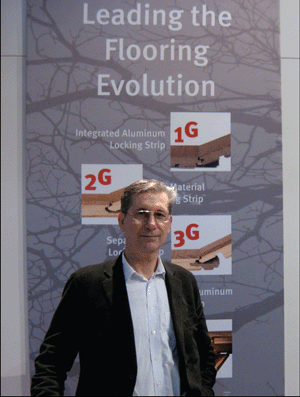 |
| Darko Pervan, Välinge’s CEO. |
|
By Matthew Spieler
Hicksville, N.Y.—A decade’s worth of legal wrangling and lawsuits over whose patents are legitimate has come to an end.
Unilin and Välinge, holders of the world’s most widely used mechanical locking systems, have agreed to set aside their disputes in favor of creating a framework allowing easier access to their respective technologies for future licenses.
The two companies had signed a preliminary agreement At Domotex in Hannover. A couple of weeks later at Surfaces, Darko Pervan, Välinge’s CEO, told
FCNews, “The time is right to see if we can settle things. Both parties want it done, as we realize this type of understanding will benefit the entire industry.”
Finalized last month, the agreement relates “to glueless joining systems for hard flooring panels” and puts an end to almost 25 legal cases over the validity and infringement on the companies’ respective patents in Belgium, France, Germany, the Netherlands, the U.K. and the U.S.
Unilin and Välinge have also created a framework that allows for future licensees to cross license patents for respective glueless technologies. As a result, both parties said they will be able to more aggressively develop and market glueless systems without patent disputes.
News of this accord comes on the heels of each company resolving two other patent disputes that have occupied much of their time, effort and money in recent years. First, Välinge and
Pergo announced a multi-faceted agreement that they settled ongoing patent disputes, entered into a cross-licensing agreement relating to basic locking technology and new advanced 5G locking systems, and agreed on a patent cooperation, which gives Välinge the rights to sublicense Pergo patents. Then, Unilin and Beaulieu International Group (BIG), which markets under the trademarks
Berry Floor and
Alloc, agreed to settle their global dispute. BIG used the Välinge system and had been involved in dozens of legal proceedings with Unilin regarding alleged infringements on the respective patents.
These deals, along with some others that have been reached by Välinge and Unilin individually, virtually put an end to all lawsuits concerning mechanical locking systems used in the industry.
“This settles much of our outstanding patent litigation,” noted
Jeff Lorberbaum, CEO of
Mohawk Industries, Unilin’s parent, in the company’s first quarter earnings statement. “We still have a limited number of companies with which we have ongoing disputes and may require additional legal action.”
As a result of the deal with Välinge, along with recent rulings in the U.S. and Europe, he said these “allow us to pursue more aggressively, companies that infringe on our technology.”
Pervan noted there remain certain exceptions to this agreement, which have not been resolved, and there may be continuing litigation against third parties to resolve these. With regard to determining the majority of the disputes, he said “the flooring industry has become extremely patent intensive, and it is not possible for one company to hold all patents related to a new technology. Välinge is convinced that cooperation among patent holders is an advantage for the industry since uncertainty, expensive legal actions and blocking of new technology could be avoided.
Moving forward on new innovations is most important to Pervan because “there is still a lot to do in developing locking technologies. The last 10 years of development was just the start. There are many new things coming that will help drive the market.”
He told FCNews, advances can still be made in many areas of the product, not to mention the locking systems themselves. Things like sound deadening, wear and moisture protection can all be improved, not to mention how new locking technologies can be incorporated on other materials, such as carpet, which will allow consumers to connect various hard and soft surfaces into one continuous floor. “It can open a whole world of design possibilities, and the whole concept of floor covering will be changed.
“But,” Pervan added, “there is no value in this if we can’t commercialize it and bring it to market.” That is where the end of the patent disputes will help as companies can now use the money they were spending on legal issues on research, development and marketing when new innovations come out.
“It can’t all be done or come out at once,” he concluded, “as the market can’t handle it. But each year, something new can be introduced to keep the category interesting.”